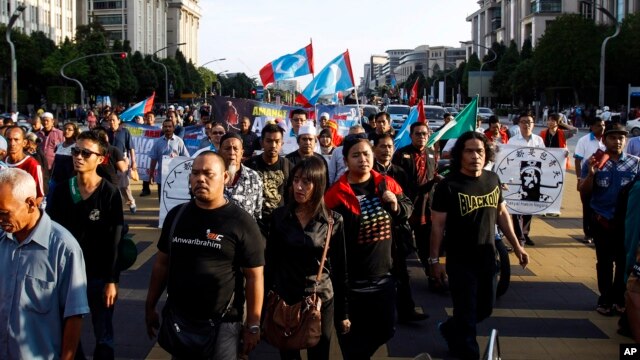
FILE - Supporters of Malaysian opposition leader Anwar Ibrahim march toward the Palace of Justice at Putrajaya, Malaysia, Feb. 10, 2015.
BANGKOK, THAILAND—
Malaysian police have targeted government critics and opposition members with sedition charges, including a famous political cartoonist known as Zunar. The investigations follow the high-profile conviction of opposition leader Anwar Ibrahim, which rights groups say was politically motivated.
Malaysian cartoonist Zulkiflee Anwar Haque, also known as Zunar, spent three days in prison last week after tweeting a cartoon lampooning the verdict of Anwar Ibrahim’s sodomy trial. He was released February 13.
The offending image depicted a judge labeled as a “lackey in black robes,” dropping an oversized gavel, but did not name individual members of government.
Twitter Embed Code is Invalid or Incomplete.
​
Police chief Khalid Abu Bakar responded via Twitter to say the tweet was seditious, and later arrested him. Zunar is denying he broke any laws.
“Unnecessary to do that over a case like this, over cartoon book. They can call me for the statement, I will come and if they want to detain me, also fine, but if they want to come to my house at night, five of them, and treating me as criminal, it’s not fine,” he said.
Zunar says officers came to his home at night to interrogate him about the tweet and then arrest him. They also questioned him about his most recent comic book, about current prime minister Najib Razak’s wife. The day after his release, police seized several hundred copies of the book, which were heading for a book launch event.
Human Rights Watch Asia Deputy Director Phil Robertson said Zunar’s arrest is one in a string of legal actions that abuse Malaysia’s vaguely defined sedition act, which placed arbitrary limits on freedom of speech.
“Khalid Abu Bakar is like a shark in the open water in the twitter-sphere: he sees something he doesn’t like and orders in the cops," said Robertson. "Because it doesn’t really define the terms of what is actually considered seditious it’s almost the definition is whatever the government wants it to be.”
In 2012, Malaysian Prime Minister Najib Razak pledged to repeal the colonial-era sedition law during his campaign for reelection. He won that campaign in a closely-fought contest that critics say was marred by fraud. But since then, human rights activists say the government has used the sedition law to go after its opponents.
Robertson pointed out there are other lawyers and activists who have been charged with sedition in the past three months, as well as members of Malaysia’s political opposition.
Last week, opposition leader Ibrahim was sentenced to five years in prison when a court rejected his appeal of a sodomy conviction. U.S. officials expressed disappointment in the decision and said it raised serious concerns about the rule of law in Malaysia. Officials also criticized the Malaysian government’s intent to expand its sedition law.
Cartoonist Zunar was awarded a Hellman Hammett Award by Human Rights Watch in 2011 for his commitment to freedom of expression and persistence in the face of political persecution.
Zunar said this was the fourth time in the past three months he has been threatened by police.
“Not only about this case only about this tweet, you know I have come out with cartoons to criticize them before. Three weeks ago when I was in London the police came to my office in KL and tried to arrest me over publishing cartoon books. This is not new for them, they have tried to detain me so many times already, I think they take this charge to really go after me.”
Zunar said he and his lawyers soon expect to face criminal charges under the sedition act.
|
|
